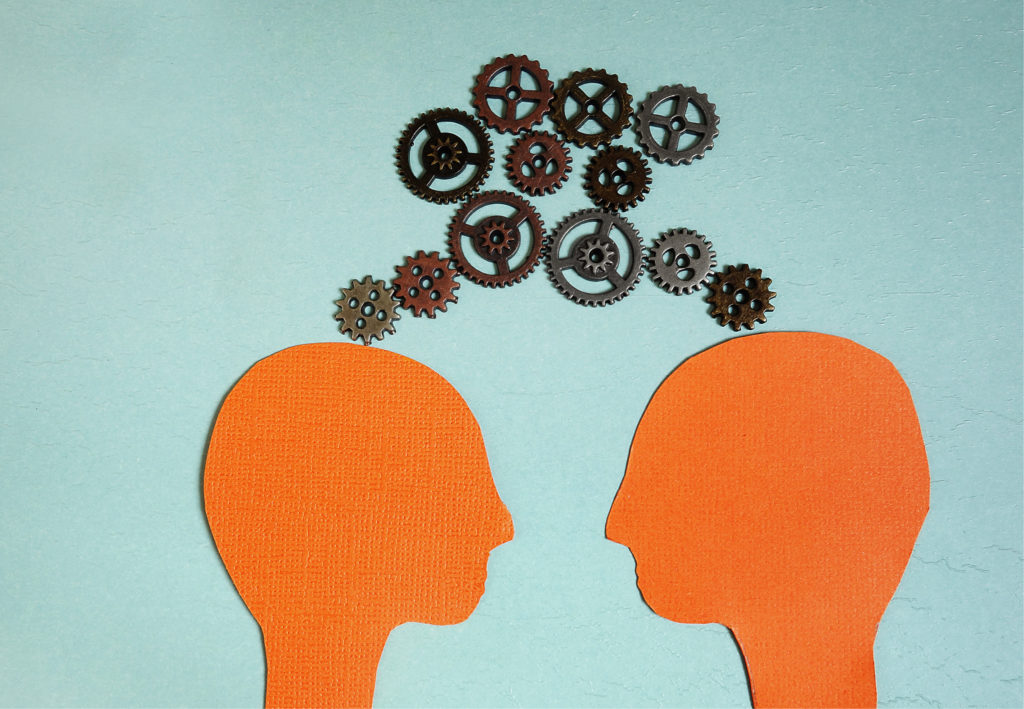Quick Hits
Daily brief research updates from the cognitive sciences

In case you didn’t know it brain synchronisation (or inter-brain synchronisation) is a thing. And a pretty cool thing. This happens when two, or more, people do similar things together and their brains sync up meaning that the firing patterns become very similar to each other.
This means that that feeling of being on the same wavelength is a feeling for the very good reason that you actually are on the same wavelength. I have written in more detail about this effect, which is important, because it also predicts many things. For example, when solving business types of tasks, brain synchronisation predicts how effectively a team will operate together. And also, how well they solve problems together. Similarly in audiences at concerts brain synchronisation predicts how well they enjoy it.
We could assume that this is related to how similar we are – with similar experiences and attitudes we are most likely to have brain synchronisation, but this piece of research shows that babies and adults playing together also show strong brain synchronisation.
Researchers at Princeton University set up the first experiment of this kind. It must be noted that measuring inter-brain synchrony is hard at the best of times due to its complexities i.e. measuring multiple brains and matching timing precisely. They managed by recruiting 42 children and using a technology called functional near-infrared spectroscopy (fNIRS) which measure blood flow similar to those pretty scans we often see.
However, 18 were too fidgety to give good readings and 3 flat out refused to wear the cap for measurement. That left 18 recordings.
Of interest is that in this study the same adult played with each child. Each child engaged in two scenarios: one playing with the adult, and another interacting with a parent while the other adult spoke to another person.
While the adult and child were playing brain synchronisation ramped up showing that similar processes were happening in their brains despite the large differences in age.
So, there you have it: parents when you play with your children you are getting on the same wavelength, and I am sure that is good for you.
For you business folk this is not just a random study, because inter-brain synchronisation is important for high performance in teams in business.
Here’s to syncing up!

Andy Habermacher
Andy is author of leading brains Review, Neuroleadership, and multiple other books. He has been intensively involved in writing and research into neuroleadership and is considered one of Europe’s leading experts. He is also a well-known public speaker speaking on the brain and human behaviour.
Andy is also a masters athlete (middle distance running) and competes regularly at international competitions (and holds a few national records in his age category).
Reference
Elise A. Piazza, Liat Hasenfratz, Uri Hasson, Casey Lew-Williams.
Infant and Adult Brains Are Coupled to the Dynamics of Natural Communication.
Psychological Science, 2019; 095679761987869
DOI: 10.1177/0956797619878698
More Quick Hits
Learning at double-speed?
Quick HitsDaily brief research updates from the cognitive sciences ouldn’t it be great if we could learn things double speed? Well, maybe we can. At least according to a study out of the University of California. During the pandemic many...
The “drunken monkey” hypothesis – proven
This had to be a story I covered – monkeys and alcohol sounds too good to pass up. But this is also linked to the “drunken monkey” hypothesis: that humans developed their love for alcohol in earlier primitive times accidentally, and then intentionally, eating fruit...
The Newly Discovered Bias That Makes Us Think We Are More Diverse Than We Are
A few weeks ago I reported on some newly discovered ways we are biased namely that we consider generic terms such as “people” as equivalent to “men” rather than men and women. This was specifically focused on gender bias but this latest piece recently published shows...
Self-awareness of autism leads to better quality of life
Autism has become a well-known diagnosis in recent years. Though some people seem to be against this sort of labelling, and the general increase in different label of mental conditions, a study out of the University of Portsmouth shows why this is actually a good...
Optimal sleep improves your brain, mental, and physical health - and it’s not as much as you think
I’ve reported multiple times on sleep and how it affects just about everything form cognitive performance, to brain plasticity, to physical performance, to mental health, and to metabolism. The question...
No change for a century – children’s backgrounds still predict the same educational outcomes
Educational opportunities have changed dramatically for children over the last century – schools have changed, and college and university admissions have grown. Or so we might think at least. But according to a study out of the University of York, that is not the...






